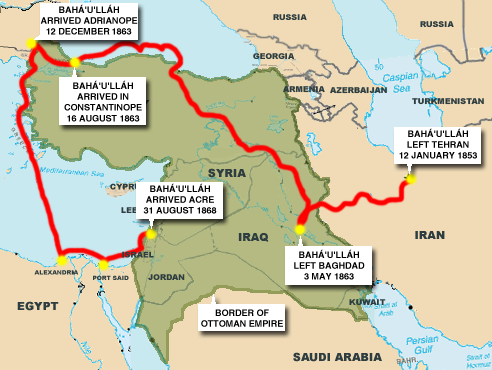Who says that anyone was actively trying to do something in order to fulfill the blossoming desert prophecies?
"The wilderness and the solitary place shall be glad for them; and the desert shall rejoice, and blossom as the rose." (Isaiah 35:1)
“It shall blossom abundantly, and rejoice even with joy and singing: the glory of Lebanon shall be given unto it, the excellency of Carmel and Sharon, they shall see the glory of the LORD, and the excellency of our God.” (Isaiah 35:2)
The prophecies do not say
how the desert would come to blossom as a rose. All it says is that it will happen, and the excellency of Carmel and Sharon will see the glory of the LORD.
Are you really suggesting that the Baha'is actively planted flowers in order to fake a fulfillment of a Bible prophecy? That is so far out in left field that it is laughable.
Its fulfillment is dependent upon reality, upon what really happened, it is not upon the interpretation of the person claiming that it has been fulfilled becaue all people interpret the prophecies to suit their particular set of beliefs.
It does not matter how clear the result is. If people do not want to believe it has been fulfilled they won't see it. This is all about psychology, it is 100% about what people
want to believe and that is what they will see. Of course, this is not happening on a conscious level, it is subconscious.
What about Micah 7:12, how could Baha'u'llah fake it's fulfillment? No, that would have been impossible because Baha'u'llah did not order His own banishments and exiles from place to place. It doesn't matter though, people who want to deny that the prophecies pertain to Baha'u'llah will find any and all manner of excuses why they are not about Him. That is why no matter how specific the prophecies are they are worthless as evidence for all but a very small number of people who really want to know the truth.
Please note that Baha’u’llah had no control over His own destiny for the last 40 years of His Life after He declared His mission because He was deemed a prisoner of the government He was banished and exiled from place to place. The following prophecy was fulfilled by these exiles and banishments.
Micah 7:12 In that day also he shall come even to thee from Assyria, and from the fortified cities, and from the fortress even to the river, and from sea to sea, and from mountain to mountain.
He shall come from Assyria: At that time Assyria was a large area. Baha’u’llah and His family lived in the part that was Persia, now Iran, in the city of Tihran.
and from the fortified cities: Baha’u’llah was banished from city to city: After being released from the Black Pit dungeon in Tihran in 1852, His family and companions had only a short time before being sent to the fortified city of Baghdad. While living in Baghdad, He gained such a large following that the enemies where shocked. Right away He was banished again, this time to the fortified city of Istanbul.
The Governor of the city refused many times to fulfill the orders that he received to banish Him again. Finally forced to follow orders, Baha’u’llah was banished again to the fortified city of Adrianople. He was honored and praised, and shown respect everywhere, until He was finally sent to the most horrific of all places, the fortress of Akka, where it was expected that He would succumb to the terrible conditions.
and from the fortress even to the river: It was while in Baghdad that the Tigris river became a special place, as Baha’u’llah crossed it to the Ridvan Garden. April 21, 1863 was the fulfilment of prophecy, as that was when Baha’u’llah declared to those around Him His Station as the Manifestation of God.
and from sea to sea: After His banishment in Baghdad, His exile was by way of the Black Sea. Still a prisoner He crossed the Black Sea from Sinope on His way to Constantinople. After the banishment in Adrianople, He crossed the Mediterranean Sea from Gallipolis in Turkey, embarking at Alexandria, Egypt, then on to the fortress of 'Akka, the most desolate of cities.
and from mountain to mountain: The time in Baghdad was turbulent with opposition. To protect His family and companions Baha’u’llah went to the Kurdistan mountains. There He lived in poverty, but the area was magnetized by His presence. After two years, He was persuaded to return to Baghdad.
The other mountain was in Israel, Mount Carmel, where He had docked before His final journey to Akka. Later He had a chance to return to Mount Carmel, to pitch His tent. Here He wrote the Tablet Of Carmel, surrounded by pilgrims looking for the return of Christ to descend from heaven. Mount Carmel is the headquarters of the Baha’i Faith.
From:
William Sears, Thief in the Night

